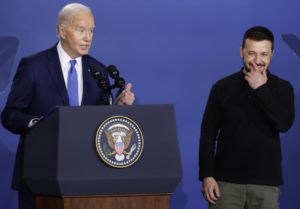Title: The Road to Conflict: Biden’s Bold Moves and Ukraine’s Debt Forgiveness

In the current geopolitical climate, the shadow of World War III looms larger than ever, with President Joe Biden and influential establishment figures seemingly racing against the clock. With President Trump poised to resume office in January, the urgency of the administration’s actions raises eyebrows and stirs concern across the globe.
Recently, Biden made headlines by announcing a decision to "forgive" a staggering $4.7 billion in loans extended to Ukraine. This development represents another phase in the extensive financial aid package, which originally garnered Congressional approval for $61 billion earlier this year. While Ukraine is expected to repay a significant portion of this aid, a covert clause in the legislation allows for the complete forgiveness of these debts before 2026.
Such financial maneuvers are not just fiscal policy — they are fundamental to the U.S.’s stance on the ongoing Ukraine conflict. Senator Rand Paul pointed out the contradiction in prioritizing foreign aid while American domestic issues remain unresolved. His attempts to challenge the forgiveness resolution were met with resistance from what he described as the "Ukraine 1st, America Last Caucus," illustrating the stark divide in Congressional sentiment regarding foreign intervention.
As the situation escalates, the U.S. has also granted Ukraine access to long-range missiles resulting in immediate diplomatic fallout, including the temporary closure of the American embassy in Russia amid fears of a retaliatory air raid. Although the embassy has since reopened, the relationship between the nations is deteriorating rapidly, which many experts at Extreme Investor Network believe could have far-reaching economic implications.
Now, as Ukrainian President Volodymyr Zelensky prepares for intense diplomatic engagements in the coming weeks, the ties between Kyiv and the West appear increasingly transactional. Many observers, including ourselves at Extreme Investor Network, interpret these engagements as a calculated effort by Western neoconservatives, leveraging Zelensky to solidify their own agendas while pushing the Ukrainian government deeper into debt and dependency.
With the Biden administration’s actions prompting questions about their long-term effects, the real concern for many taxpayers revolves around how much more financial and military support Biden is willing to secure for Ukraine, and what that means for American stakeholders.
As we approach January 20, we must ask: Is this strategy merely a preemptive strike to create a geopolitical mess for a potential Biden successor to navigate? Here at Extreme Investor Network, we are closely monitoring these developments not just as a matter of policy, but as a critical economic issue that could define the financial landscape for years to come.
Stay tuned with us for deeper insights into the unfolding economic and political strategies that will shape not only the U.S. but the global economy in the coming months and years.

